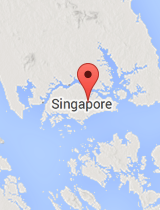Medical Summary
The health risk information presented here is summarized from Shoreland Travax®, a decision-support tool used by health care providers to perform a detailed health risk analysis based on specific locations, individual travel styles, and traveler risk behaviors. Travax provides practitioners current, independently researched malaria risk and prevention recommendations in a map-based format that goes beyond the annual WHO and US CDC statements included here. Not included here are current reports from Travax of disease outbreaks or environmental events that may pose elevated risks to travelers’ health and safety. The Providers section of this site offers a directory of health care providers who utilize Shoreland Travax for travel health counseling. Learn more about the detailed reports and maps available from these practitioners (includes links to samples).
General Information
Singapore is an advanced economy classified as high income. Located in Southeast Asia along the Strait of Johar and the Strait of Singapore (between Malaysia and Indonesia), the climate is classified as humid equatorial (no dry season).
Vaccinations
Yellow Fever
See also: Library article for Yellow Fever
Although yellow fever does not occur in Singapore, an official yellow fever vaccination certificate may be required depending on your itinerary.
- Requirement: A certificate proving yellow fever vaccination is required for travelers aged ≥ 1 year coming from countries with risk of YF transmission. This also applies to airport transit stops (no exit through immigration checkpoint) longer than 12 hours in risk countries.
Other Vaccines
Depending on your itinerary, your personal risk factors, and the length of your visit, your health care provider may offer you vaccination against COVID-19, hepatitis A, hepatitis B, influenza, Japanese encephalitis, measles, mumps, rubella, rabies, or typhoid fever. Routine immunizations, such as those that prevent tetanus/diphtheria or "childhood" diseases, should be reviewed and updated as needed.
Malaria
See also: Library article for Malaria
The following is current information as reported by the World Health Organization (WHO) and the US Centers for Disease Control (CDC):
WHO—International Travel and Health (current online update, Country List)
No statement given.CDC—Health Information for International Travel (current online edition)
Areas with malaria: None.
Drug resistance: Not applicable.
Other Concerns
Travelers' Diarrhea
See also: Library article for Travelers' Diarrhea
Minimal risk (comparable to that in other industrialized countries) exists throughout the country. Community sanitation and food safety measures are generally good, and health concerns related to food and beverage consumption are minimal. Risk for viral gastroenteritis (e.g., norovirus) may be elevated based on season, traveler itinerary, and/or level of community transmission.
Travelers should carry loperamide for self-treatment of diarrhea and, if risk is moderate to high, an antibiotic to add if diarrhea is severe. Consult a knowledgeable health care provider regarding which antibiotic is appropriate for you and most effective for your destination.
Other Food-Borne Illnesses
Precautions to prevent seafood poisoning may be needed.
Insect- and Arthropod-Borne Diseases
Chikungunya, dengue, murine typhus, Zika may pose a risk. Personal protective measures are important.
Other Disease and Health Risks
Additional concerns include air pollution, enteroviruses, leptospirosis, marine hazards, melioidosis, tuberculosis.
Consular Advice
The material below includes information from the US Department of State (DOS), the UK Foreign, Commonwealth & Development Office (FCO), Global Affairs Canada (GAC), and Australia's Department of Foreign Affairs and Trade (DFAT), as well as from additional open-source material. Standard safety precautions that apply to all international travel can be found in the Library article Safety and Security.
Terrorism Risk
Risk of attack by domestic and transnational terrorist groups exists throughout the country. Targets may include domestic and international organizations and businesses; public places and events, including those frequented by tourists; and transportation systems.
Crime
Negligible risk of violent crime exists throughout the country.
Moderate risk of petty crime exists in areas frequented by tourists, including hotels, public transportation, markets, and shopping malls.
Scams involving time-share and property rentals and exorbitant fees for products have been reported.
Unsafe Areas
Piracy (involving commercial vessels) may occur in coastal areas and the Strait of Malacca.
Water Safety
Rent water sports equipment from reputable operators. Scuba dive only with personnel certified by PADI or NAUI, and only use equipment from PADI- or NAUI-certified dive operators.
Transportation Safety
Low risk of traffic-related injury or death exists. The road traffic death rate is less than 7 per 100,000 population, the lowest risk category.
Structural standards for vehicles may not meet international standards.
Airline Safety
The US Federal Aviation Administration has determined that the civil aviation authority of this country oversees its air carriers in accordance with minimum international safety standards.
Natural Disasters
The monsoon seasons are from December through March and from June through September. Floods, mudslides, and landslides may occur.
Seismic activity frequently occurs.
Consular Information
Selected Embassies or Consulates in Singapore
- United States: [+65] 6476-9100; sg.usembassy.gov
- Canada: [+65] 6854-5900; singapore.gc.ca
- United Kingdom: [+65] 6424-4200; www.gov.uk/world/organisations/british-high-commission-singapore
- Australia: [+65] 6836-4100; singapore.embassy.gov.au
Singapore's Embassies or Consulates in Selected Countries
- In the U.S.: www.mfa.gov.sg/washington
- In Canada: www.mfa.gov.sg/toronto
- In the U.K.: www.mfa.gov.sg/london
- In Australia: www.mfa.gov.sg/canberra
Visa/HIV Testing
HIV testing is required to obtain a work or residence visa. Travelers, including short-term travelers, may be detained or deported after arrival if found to be positive for HIV or hepatitis.

